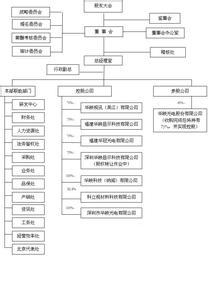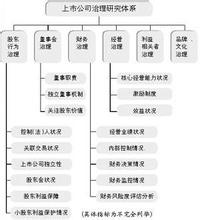Issued by:
China Securities Regulatory Commission
State Economic and Trade Commission
January 7, 2001
(Zhengjianfa No.1 of 2002)
Code of Corporate Governance for Listed Companies
Preface
In accordance with the basic principles of the Company Law,the Securities Law and other relevant laws and regulations, as wellas the commonly accepted standards in international corporategovernance, the Code of Corporate Governance for Listed Companies(hereinafter referred to as "the Code") is formulated to promotethe establishment and improvement of modern enterprise system bylisted companies, to standardize the operation of listed companiesand to bring forward the healthy development of the securitiesmarket of our country.
The Code sets forth, among other things, the basic principlesfor corporate governance of listed companies in our country, themeans for the protection of investors' interests and rights, thebasic behavior rules and moral standards for directors,supervisors, managers and other senior management members of listedcompanies.
The Code is applicable to all listed companies within theboundary of the People's Republic of China. Listed companies shallact in the spirit of the Code in their efforts to improve corporategovernance. Requirements of the Code shall be embodied when listedcompanies formulate or amend their articles of association or rulesof governance. The Code is the major measuring standard forevaluating whether a listed company has a good corporate governancestructure, and if major problems exist with the corporategovernance structure of a listed company, the securitiessupervision and regulation authorities may instruct the company tomake corrections in accordance with the Code.
Chapter 1. Shareholders and Shareholders' Meetings
(1) Rights of Shareholders
1. As the owner of a company, the shareholders shall enjoy thelegal rights stipulated by laws, administrative regulations and thecompany's articles of association. A listed company shall establisha corporate governance structure sufficient for ensuring the fullexercise of shareholders' rights.
2. The corporate governance structure of a company shallensure fair treatment toward all shareholders, especially minorityshareholders. All shareholders are to enjoy equal rights and tobear the corresponding duties based on the shares they hold.
3. Shareholders shall have the right to know about and theright to participate in major matters of the company set forth inthe laws, administrative regulations and articles of association. Alisted company shall establish efficient channels of communicationwith its shareholders.
4. Shareholders shall have the right to protect theirinterests and rights through civil litigation or other legal meansin accordance with laws and administrative regulations. In theevent the resolutions of shareholders' meetings or the resolutionsof the board of directors are in breach of laws and administrativeregulations or infringe on shareholders' legal interests andrights, the shareholders shall have the right to initiatelitigation to stop such breach or infringement. The directors,supervisors and managers of the company shall bear the liability ofcompensation in cases where they violate laws, administrativeregulations or articles of association and cause damages to thecompany during the performance of their duties. Shareholders shallhave the right to request the company to sue for such compensationin accordance with law.
(2) Rules for Shareholders' Meetings
5. A listed company shall set out convening and votingprocedures for shareholders' meetings in its articles ofassociation, including rules governing such matters asnotification, registration, review of proposals, voting, countingof votes, announcement of voting results, formulation ofresolutions, recording of minutes and signatories, publicannouncement, etc.
6. The board of directors shall earnestly study and arrangethe agenda for a shareholders' meeting. During a shareholders'meeting, each item on the agenda shall be given a reasonable amountof time for discussion.
7. A listed company shall state in its articles of associationthe principles for the shareholders' meeting to grant authorizationto the board of directors. The content of such authorization shallbe explicit and concrete.
8. Besides ensuring that shareholders' meetings proceedlegally and effectively, a listed company shall make every effort,including fully utilizing modern information technology means, toincrease the number of shareholders attending the shareholders'meetings. The time and location of the shareholders' meetings shallbe set so as to allow the maximum number of shareholders toparticipate.
9. The shareholders can either be present at the shareholders'meetings in person or they may appoint a proxy to vote on theirbehalf, and both means of voting possess the same legal effect.
10. The board of directors, independent directors andqualified shareholders of a listed company may solicit for theshareholders' right to vote in a shareholders' meeting. No paymentsshall be made to the shareholders for such solicitation, andadequate information shall be provided to persons whose votingrights are being solicited.
11. Iinstitutional investors shall play a role in theappointment of company directors, the compensation and supervisionof management and major decision-making processes.
(3) Related Party Transactions
12. Written agreements shall be entered into for related partytransactions among a listed company and its connected parties. Suchagreements shall observe principles of equality, voluntarity, andmaking compensation for equal value. The contents of suchagreements shall be specific and concrete. Matters such as thesigning, amendment, termination and execution of such agreementsshall be disclosed by the listed company in accordance withrelevant regulations.
13. Efficient measures shall be adopted by a listed company toprevent its connected parties from interfering with the operationof the company and damaging the company's interests by monopolizingpurchase or sales channels. Related party transactions shallobserve commercial principles. In principle, the prices for relatedparty transactions shall not deviate from an independent thirdparty's market price or charging standard. The company shall fullydisclose the basis for pricing for related party transactions.
14. The assets of a listed company belong to the company. Thecompany shall adopt efficient measures to prevent its shareholdersand their affiliates from misappropriating or transferring thecapital, assets or other resources of the company through variousmeans. A listed company shall not provide financial guarantees forits shareholders or their affiliates.
Chapter 2. Listed Company and Its Controlling Shareholders
(1) Behavior Rules for Controlling Shareholders
15. During the restructuring and reorganization of a companythat plans to list, the controlling shareholders shall observe theprinciple of "first restructuring, then listing", and shallemphasize the establishment of a reasonably balanced shareholdingstructure.
16. During the restructuring and reorganization of a companythat plans to list, the controlling shareholders shall sever thecompany's social functions and strip out non-operational assets.Non-operational institutions, welfare institutions and theirfacilities shall not be included in the listed company.
17. Controlling shareholders' remaining enterprises orinstitutions that provide services for the major business of thelisted company may be restructured into specialized companies inaccordance with the principles of specialization and marketpractice, and may enter into relevant agreements with the listedcompany in accordance with commercial principles. Remainingenterprises engaged in other businesses shall increase theircapability of independent development. Remaining enterprises notcapable to continue operation shall exit the market, through suchchannels as bankruptcy, in accordance with relevant laws andregulations. Enterprises meeting certain requirements duringrestructuring may sever all their social functions and dispersesurplus employees at one time and keep no remainingenterprises.
18. The controlling shareholders shall support the listedcompany to further reform labor, personnel and distributionsystems, to transform operational and managerial mechanisms, and toestablish such systems as: management selection through bidding andcompetition, with the chance for both promotion and demotion;employment of employees on the basis of competitive selection, withthe chance for both employment and termination of employment;income distribution scheme that provides sufficient incentive, withthe chance to both increase and decrease the remuneration; etc.
19. The controlling shareholders owe a duty of good faithtoward the listed company and other shareholders. The controllingshareholders of a listed company shall strictly comply with lawsand regulations while exercising their rights as investors, andshall be prevented from damaging the listed company's or othershareholders' legal rights and interests, through means such asassets restructuring, or from taking advantage of their privilegedposition to gain additional benefit.

20. The controlling shareholders shall nominate the candidatesfor directors and supervisors in strict compliance with the termsand procedures provided for by laws, regulations and the company'sarticles of association. The nominated candidates shall possesscertain relevant professional knowledge and the capability to makedecisions or supervise. The resolutions made by the shareholders'meetings electing personnel or the board of directors' resolutionsappointing personnel shall not be subjected to approval proceduresby the controlling shareholders. The controlling shareholders areforbidden to appoint senior management personnel by circumventingthe shareholders' meetings or the board of directors.
21. The important decisions of a listed company shall be madethrough a shareholders' meeting or board of directors' meeting inaccordance with law. The controlling shareholders shall notdirectly or indirectly interfere with the company's decisions orbusiness activities conducted in accordance with laws; nor shallthey impair the listed company's or other shareholders' rights andinterests.
(2) Independence of Listed Company
22. A listed company shall be separated from its controllingshareholders in such aspects as personnel, assets and financialaffairs, shall be independent in institution and business, shallpractice independent business accounting, and shall independentlybear risks and obligations.
23. The personnel of a listed company shall be independentfrom the controlling shareholders. The management, financialofficers, sales officers and secretary of the board of directors ofthe listed company shall not take posts other than as a director ina controlling shareholder's entities. In the case where a member ofa controlling shareholder's senior management concurrently holdsthe position of director of the listed company, such member shallensure adequate time and energy to perform the work for the listedcompany.
24. The assets invested by a controlling shareholder in alisted company shall be independent, complete and with clearindication of ownership. Where controlling shareholders investnon-cash assets into a listed company, ownership transferprocedures shall be completed and explicit boundaries for suchassets shall be clarified. The listed company shall independentlyregister such assets, independently set up account for such assets,and independently carry out business accounting and management forsuch assets. The controlling shareholders shall not misappropriateor control such assets or interfere with the listed company'smanagement of such assets.
25. A listed company shall establish sound financial andaccounting management systems in accordance with laws andregulations and shall conduct independent business accounting.Controlling shareholders shall respect the financial independenceof the company and shall not interfere with the financial andaccounting activities of the company.
26. The board of directors, the supervisory committee andother internal offices of a listed company shall operate in anindependent manner. There shall be no subordination relationshipbetween, on the one hand, a listed company or its internal officesand, on the other hand, the company's controlling shareholders ortheir internal offices, and the latter shall not give plans orinstructions concerning the listed company's business operation tothe former, nor shall the latter interfere with the independentoperation of the former in any other manner.
27. A listed company's business shall be completelyindependent from that of its controlling shareholders. Controllingshareholders and their subsidiaries shall not engage in the same orsimilar business as that of the listed company. Controllingshareholders shall adopt efficient measures to avoid competitionwith the listed company.
Chapter 3. Directors and Board of Directors
(1) Election Procedures for Directors
28. A company shall establish a standardized and transparentprocedure for director election in its articles of association, soas to ensure the openness, fairness, impartialness and independenceof the election.
29. Detailed information regarding the candidates fordirectorship shall be disclosed prior to the convening of theshareholders' meeting to ensure adequate understanding of thecandidates by the shareholders at the time of voting.
30. Candidates for directorship shall give writtenundertakings to accept their nomination, to warrant thetruthfulness and completeness of the candidate's information thathas been publicly disclosed and to promise to earnestly performtheir duties once elected.
31. The election of directors shall fully reflect the opinionsof minority shareholders. A cumulative voting system shall beearnestly advanced in shareholders' meetings for the election ofdirectors. Listed companies that are more than 30% owned bycontrolling shareholders shall adopt a cumulative voting system,and the companies that do adopt such a system shall stipulate theimplementing rules for such cumulative voting system in theirarticles of association.
32. Appointment agreements shall be entered into by a listedcompany and its directors to clarify such matters as the rights andobligations between the company and the director, the term of thedirectorship, the director's liabilities in case of breach of laws,regulations or articles of association, and the compensation fromthe company in case of early termination of the appointmentagreement for cause by the company.
(2) The Duties and Responsibilities of Directors
33. Directors shall faithfully, honestly and diligentlyperform their duties for the best interests of the company and allthe shareholders.
34. Directors shall ensure adequate time and energy for theperformance of their duties.
35. Directors shall attend the board of directors meetings ina diligent and responsible manner, and shall express their clearopinion on the topics discussed. When unable to attend a board ofdirectors meeting, a director may authorize another director inwriting to vote on his behalf and the director who makes suchauthorization shall be responsible for the vote.
36. The board of directors shall abide by relevant laws,regulations, rules and the company's articles of association, andshall strictly fulfill the undertakings they made publicly.
37. Directors shall earnestly attend relevant trainings tolearn about the rights, obligations and duties of a director, tofamiliarize themselves with relevant laws and regulations and tomaster relevant knowledge necessary for acting as directors.
38. In cases where the resolutions of board of directorsviolate laws or regulations or a listed company's articles ofassociation and cause losses to the listed company, directorsresponsible for making such resolutions shall be liable forcompensation, except those proved to have objected and theobjections of whom have been recorded in the minutes.
39. After approval by the shareholders' meeting, a listedcompany may purchase liability insurance for directors. Suchinsurance shall not cover the liabilities arising in connectionwith directors' violation of laws, regulations or the company'sarticles of association.
(3) Duties and Composition of the Board of Directors
40. The number of directors and the structure of the board ofdirectors shall be in compliance with laws and regulations andshall ensure the effective discussion and efficient, timely andprudent decision-making process of the board of directors.
41. The board of directors shall possess proper professionalbackground. The directors shall possess adequate knowledge, skilland quality to perform their duties.
42. The board of directors shall be made accountable toshareholders. A listed company's corporate governance frameworkshall ensure that the board of directors can exercise its power inaccordance with laws, administrative regulations and the company'sarticles of association.
43. The board of directors shall earnestly perform its dutiesas stipulated by laws, regulations and the company's articles ofassociation, shall ensure that the company complies with laws,regulations and its articles of association, shall treat all theshareholders equally and shall be concerned with the interests ofstakeholders.
(4) Rules and Procedure of the Board of Directors
44. A listed company shall formulate rules of procedure forits board of directors in its articles of association to ensure theboard of directors' efficient function and rational decisions.
45. The board of directors shall meet periodically and shallconvene interim meetings in a timely manner when necessary. Eachboard of directors' meeting shall have a pre-decided agenda.
46. The meetings of the board of directors of a listed companyshall be conducted in strict compliance with prescribed procedures.The board of directors shall send notice to all directors inadvance, at the stipulated time, and shall provide sufficientmaterials, including relevant background materials for the items onthe agenda and other information and data that may assist thedirectors in their understanding of the company's businessdevelopment. When two or more independent directors deem thematerials inadequate or unclear, they may jointly submit a writtenrequest to postpone the meeting or to postpone the discussion ofthe related matter, which shall be granted by the board ofdirectors.
47. The minutes of the board of directors' meetings shall becomplete and accurate. The secretary of the board of directorsshall carefully organize the minutes and the records of discussedmatters. Directors that have attended the meetings and the personwho drafted the minutes shall sign the minutes. The minutes of theboard of directors' meetings shall be properly maintained andstored as important records of the company, and may be used as animportant basis for clarifying responsibilities of individualdirectors in the future.
48. In the case of authorization to the chairman of the boardof directors to exercise part of the board of directors' power ofoffice when the board of directors is not in session, clear rulesand principles for such authorization shall be stated in thearticles of association of the listed company. The content of suchauthorization shall be clear and specific. All matters related tomaterial interests of the company shall be submitted to the boardof directors for collective decision.
(5) Independent Directors
49. A listed company shall introduce independent directors toits board of directors in accordance with relevant regulations.Independent directors shall be independent from the listed companythat employs them and the company's major shareholders. Anindependent director may not hold any other position apart fromindependent director in the listed company.
50. The independent directors shall bear the duties of goodfaith and due diligence toward the listed company and all theshareholders. They shall earnestly perform their duties inaccordance with laws, regulations and the company's articles ofassociation, shall protect the overall interests of the company,and shall be especially concerned with protecting the interests ofminority shareholders from being infringed. Independent directorsshall carry out their duties independently and shall not subjectthemselves to the influence of the company's major shareholders,actual controllers, or other entities or persons who are interestedparties of the listed company.
51. Relevant laws and regulations shall be complied with formatters such as the qualifications, procedure of election andreplacement, and duties of independent directors.
(6) Specialized Committees of the Board of Directors
52. The board of directors of a listed company may establish acorporate strategy committee, an audit committee, a nominationcommittee, a remuneration and appraisal committee and other specialcommittees in accordance with the resolutions of the shareholders'meetings. All committees shall be composed solely of directors. Theaudit committee, the nomination committee and the remuneration andappraisal committee shall be chaired by an independent director,and independent directors shall constitute the majority of thecommittees. At least one independent director from the auditcommittee shall be an accounting professional.
53. The main duties of the corporate strategy committee shallbe to conduct research and make recommendations on the long-termstrategic development plans and major investment decisions of thecompany.
54. The main duties of the audit committee are (1) torecommend the engagement or replacement of the company's externalauditing institutions; (2) to review the internal audit system andits execution; (3) to oversee the interaction between the company'sinternal and external auditing institutions; (4) to inspect thecompany's financial information and its disclosure; and (5) tomonitor the company's internal control system.
55. The main duties of the nomination committee are (1) toformulate standards and procedures for the election of directorsand make recommendations; (2) to extensively seek qualifiedcandidates for directorship and management; and (3) to review thecandidates for directorship and management and makerecommendations.
56. The main duties of the remuneration and appraisalcommittee are (1) to study the appraisal standard for directors andmanagement personnel, to conduct appraisal and to makerecommendations; and (2) to study and review the remunerationpolicies and schemes for directors and senior managementpersonnel.
57. Each specialized committee may engage intermediaryinstitutions to provide professional opinions, the relevantexpenses to be borne by the company.
58. Each specialized committee shall be accountable to theboard of directors. All proposals by specialized committees shallbe submitted to the board of directors for review and approval.
Chapter 4. The Supervisors and the Supervisory Board
(1) Duties and Responsibilities of the Supervisory Board
59. The supervisory board of a listed company shall beaccountable to all shareholders. The supervisory board shallsupervise the corporate finance, the legitimacy of directors,managers and other senior management personnel's performance ofduties, and shall protect the company's and the shareholders' legalrights and interests.
60. Supervisors shall have the right to learn about theoperating status of the listed company and shall have thecorresponding obligation of confidentiality. The supervisory boardmay independently hire intermediary institutions to provideprofessional opinions.
61. A listed company shall adopt measures to ensuresupervisors' right to learn about company's matters and shallprovide necessary assistance to supervisors for their normalperformance of duties. No one shall interfere with or obstructsupervisors' work. A supervisor's reasonable expenses necessary toperform their duties shall be borne by the listed company.
62. The record of the supervisory committee's supervision aswell as the results of financial or other specific investigationsshall be used as an important basis for performance assessment ofdirectors, managers and other senior management personnel.
63. The supervisory board may report directly to securitiesregulatory authorities and other related authorities as well asreporting to the board of directors and the shareholders' meetingswhen the supervisory board learns of any violation of laws,regulations or the company's articles of association by directors,managers or other senior management personnel.
(2) The Composition and Steering of the Supervisory Board
64. Supervisors shall have professional knowledge or workexperience in such areas as law and accounting. The members and thestructure of the supervisory board shall ensure its capability toindependently and efficiently conduct its supervision of directors,managers and other senior management personnel and to supervise andexamine the company's financial matters.
65. A listed company shall formulate in its articles ofassociation standardized rules and procedures governing thesteering of the supervisory board. The supervisory board's meetingsshall be convened in strict compliance with the rules andprocedures.
66. The supervisory board shall meet periodically and shallconvene interim meetings in a timely manner when necessary. If forany reason a supervisory board meeting cannot be convened asscheduled, an explanation shall be publicly announced.
67. The supervisory board may ask directors, managers andother senior management personnel, internal auditing personnel andexternal auditing personnel to attend the meetings of supervisoryboard and to answer the questions that the supervisory board isconcerned with.
68. Minutes shall be drafted for the meetings of thesupervisory board, which shall be signed by the supervisors thatattended the meetings and the person who drafted the minutes. Thesupervisors shall have the right to request to record in theminutes explanatory notes to their statements in the meetings.Minutes of the meetings of the supervisory board shall be properlymaintained and stored as important records of the company.
Chapter 5. Performance Assessments and Incentive andDisciplinary Systems
(1) Performance Assessment for Directors, Supervisors andManagement Personnel
69. A listed company shall establish fair and transparentstandards and procedures for the assessment of the performance ofdirectors, supervisors and management personnel.
70. The evaluation of the directors and management personnelshall be conducted by the board of directors or by the remunerationand appraisal committee of the board of directors. The evaluationof the performance of independent directors and supervisors shallbe conducted through a combination of self-review and peerreview.
71. The board of directors shall propose a scheme for theamount and method of compensation for directors to theshareholders' meeting for approval. When the board of directors orthe remuneration and appraisal committee reviews the performance ofor discusses the compensation for a certain director, such directorshall withdraw.
72. The board of directors and the supervisory board shallreport to the shareholder meetings the performance of the directorsand the supervisors, the results of the assessment of their workand their compensation, and shall disclose such information.
(2) Selection of Management Personnel
73. The recruiting of management personnel of a listed companyshall be conducted in strict observation with relevant laws andregulations and the company's articles of association. Noinstitution or individual shall interfere with a listed company'snormal recruiting procedure for management personnel.
74. The recruiting of management personnel of a listed companyshall, to the extent possible, be carried out in a fair andtransparent manner, through domestic and international markets forprofessional management, making full use of intermediaryagencies.
75. Employment agreements shall be entered into by a listedcompany and its management personnel to clarify each party's rightsand obligations.
76. The appointment and removal of managers shall be incompliance with legal procedure and shall be publiclyannounced.
(3) Incentive and Disciplinary Systems for Management
77. To attract qualified personnel and to maintain thestability of management, a listed company shall establish rewardingsystems that link the compensation for management personnel to thecompany's performance and to the individual's work performance.
78. The performance assessment for management personnel shallbecome a basis for determining the compensation and other rewardingarrangements for the person reviewed.
79. The results of the performance assessment shall beapproved by the board of directors, explained at the shareholders'meetings and disclosed.
80. A listed company shall specify management personnel'sduties and responsibilities in its articles of association. Ifmanagement personnel violate laws, regulations or the company'sarticles of association and cause damages to the company, the boardof directors of the company shall actively investigate and pursuesuch personnel's legal liabilities.
Chapter 6. Stakeholders
81. A listed company shall respect the legal rights of banksand other creditors, employees, consumers, suppliers, the communityand other stakeholders.
82. A listed company shall actively cooperate with itsstakeholders and jointly advance the company's sustained andhealthy development.
83. A company shall provide the necessary means to ensure thelegal rights of stakeholders. Stakeholders shall have opportunitiesand channels for redress for infringement of rights.
84. A company shall provide necessary information to banks andother creditors to enable them to make judgments and decisionsabout the company's operating and financial situation.
85. A company shall encourage employees' feedback regardingthe company's operating and financial situations and importantdecisions affecting employee's benefits through directcommunications with the board of directors, the supervisory boardand the management personnel.
86. While maintaining the listed company's development andmaximizing the benefits of shareholders, the company shall beconcerned with the welfare, environmental protection and publicinterests of the community in which it resides, and shall payattention to the company's social responsibilities.
Chapter 7. Information Disclosure and Transparency
(1) Listed Companies' Ongoing Information Disclosure
87. Information disclosure is an ongoing responsibility oflisted companies. A listed company shall truthfully, accurately,completely and timely disclose information as required by laws,regulations and the company's articles of association.
88. In addition to disclosing mandatory information, a companyshall also voluntarily and timely disclose all other informationthat may have a material effect on the decisions of shareholdersand stakeholders, and shall ensure equal access to information forall shareholders.
89. Disclosed information by a listed company shall be easilycomprehensible. Companies shall ensure economical, convenient andspeedy access to information through various means (such as theInternet).
90. The secretary of the board of directors shall be in chargeof information disclosure, including formulating rules forinformation disclosure, receiving visits, providing consultation,contacting shareholders and providing publicly disclosedinformation about the company to investors. The board of directorsand the management shall actively support the secretary's work. Noinstitutions or individuals shall interfere with the secretary'swork.
(2) Disclosure of Information Regarding CorporateGovernance
91. A listed company shall disclose information regarding itscorporate governance in accordance with laws, regulations and otherrelevant rules, including but not limited to: (1) the members andstructure of the board of directors and the supervisory board; (2)the performance and evaluation of the board of directors and thesupervisory board; (3) the performance and evaluation of theindependent directors, including their attendance at board ofdirectors' meetings, their issuance of independent opinions andtheir opinions regarding related party transactions and appointmentand removal of directors and senior management personnel; (4) thecomposition and work of the specialized committees of the board ofdirectors; (5) the actual state of corporate governance of thecompany, the gap between the company's corporate governance and theCode, and the reasons for the gap; and (6) specific plans andmeasures to improve corporate governance.
(3) Disclosure of Controlling Shareholder's Interests
92. A company shall timely disclose detailed information abouteach shareholder who owns a comparatively large percentage ofshares of the company, the shareholders who actually control thecompany when acting in concert and the company's actual controllersin accordance with relevant regulations.
93. A listed company shall learn about and disclose in atimely manner, changes in the shareholding of the company and otherimportant matters that may cause changes in the shareholding of thecompany.
94. When controlling shareholders increase or decrease theirshareholding or pledge the company's shares, or when the actualcontrol of the company transfers, the company and its controllingshareholders shall timely and accurately disclose relevantinformation to all shareholders.
Chapter 8. Supplementary Article
95. This Code shall come into effect on the date ofissuance.
 爱华网
爱华网



